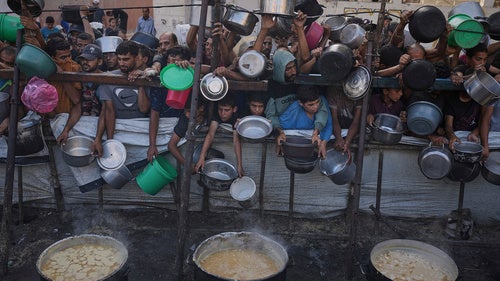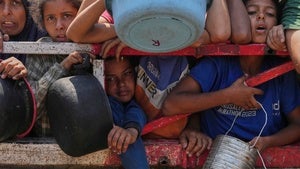Famine in Gaza is a Preventable Catastrophe. A Humanitarian Ceasefire is the First Step.

Distinguished Fellow and former Executive Director of the World Food Programme Ertharin Cousin on summoning the political courage to intervene in Gaza.
The humanitarian crisis unfolding in Gaza has crossed a moral threshold, and the time for hesitation has passed. The region now teeters on the edge of famine—if not already gripped by its full effects. The international community, and particularly the United States, must demand an immediate humanitarian ceasefire to enable a full-scale humanitarian operation. The international community must press for the reopening and protection of border crossings.
Let us be clear about the full context. On October 7, 2023, Hamas launched a brutal attack on Israeli civilians—killing, kidnapping, and terrorizing hundreds. These actions were unconscionable. The continued detention of hostages, including women and children, is unacceptable and in violation of international law. Securing their release remains a global imperative.
Yet the suffering of Israeli civilians does not justify the indiscriminate punishment of Palestinian civilians. We cannot, as a community of nations committed to international norms, allow one crime to permit another. The people of Gaza—most of whom are women and children and not combatants—are enduring a manufactured humanitarian catastrophe that violates not only the Geneva Conventions but our shared moral code
From my time as Executive Director of the United Nations World Food Programme, the United Nations agency responsible for emergency food assistance, I know what famine looks like. It is a systemic collapse: the failure of food systems, water infrastructure, health care, and safety. It is not a natural disaster. It is not just about empty shelves. It is the result of political choices.
In Gaza, those choices have led to the destruction of essential infrastructure. Hospitals, bakeries, sanitation systems, and water pipes have been obliterated. Humanitarian convoys have been denied entry or attacked. Aid workers have lost their lives. More than three-quarters of the population is displaced. Half a million people face catastrophic hunger. Children are dying of malnutrition. Families boil grass for soup. This is not hypothetical. This is famine in motion.
And while technical declarations of famine require a specific threshold of mortality and malnutrition, that debate obscures the truth: this is already a famine for those experiencing it. Delaying action until metrics are met will mean thousands more lives lost.
Some argue that a ceasefire would allow Hamas to regroup or reward terrorism. But protecting civilians is not a concession—it is a requirement under international law. Starving children is not strategy. Withholding aid does not bring justice. There are means to hold perpetrators accountable while still upholding the rights and needs of innocent people.
A humanitarian ceasefire would allow life-saving operations to resume. WFP staff, who are responsible for emergency food assistance, have made clear that they are prepared—alongside their partners—to deliver 600 trucks of aid daily and operate 400 feeding centers across Gaza. These are not aspirational goals. They are logistical plans developed by professionals who have responded to the world’s worst crises. As someone who once led that agency, I say unequivocally: they can deliver—if the conditions are created.
Until very recently, the United States has long been the single largest donor to humanitarian assistance worldwide. It also holds unique diplomatic influence in this conflict. That influence must be exercised in defense of Israel’s security and also in defense of human rights and humanitarian access. Words of concern must now be matched with concrete policy action.
Washington must insist on a ceasefire that enables full-scale humanitarian operations and must recognize that restoring humanitarian access is not just an act of compassion—it is a strategic imperative for regional stability and global legitimacy.
As the world watches, the question before us is simple: will we allow a famine to unfold in real time, or will we summon the political courage to intervene?
This moment demands more than statements of concern. It requires decisive action to uphold the principles on which the postwar international system was built. If we fail to act now, future generations will judge us—not only for what we allowed but for what we chose not to do when it mattered most.
Let us choose differently. Let us choose humanity.


Related Content
 Food and Agriculture
Food and Agriculture